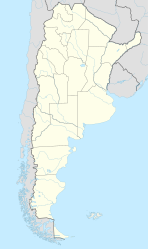Oberá
| Oberá | |||
|---|---|---|---|
| City | |||

Monument built for the city's 50th anniversary
|
|||
|
|||
| Location of Oberá in Argentina | |||
| Coordinates: 27°29′S 55°8′W / 27.483°S 55.133°WCoordinates: 27°29′S 55°8′W / 27.483°S 55.133°W | |||
| Country | Argentina | ||
| Province | Misiones | ||
| Department | Oberá | ||
| Government | |||
| • Mayor | Ewaldo Rindfleich | ||
| Area | |||
| • Total | 155 km2 (60 sq mi) | ||
| Elevation | 298 m (978 ft) | ||
| Population (2012) | |||
| • Total | 61,672 | ||
| • Density | 400/km2 (1,000/sq mi) | ||
| Time zone | ART (UTC-3) | ||
| CPA base | N3360 | ||
| Dialing code | +54 3755 | ||
| Website | Official website | ||
Oberá is a city in the interfluvial province of Misiones, Argentina, and the head town of the Oberá Department. It is located 96 km east of the provincial capital Posadas, on National Route 14, and about 1,150 km north of Buenos Aires. It has about 66,000 inhabitants according to the 2010 census [INDEC].
Oberá is the second city in size and importance of the province, and the core of the Sierras Centrales region. The area is a colorful landscape, with luxurious vegetation, streams, cascades and hilly areas. Oberá is also the educational and cultural capital of the central region of the province, with availability of universities and colleges (such as the National University of Misiones). Its economy is based on agriculture and industry.
The local culture is marked by European influences, since the area was settled by numerous colonies of immigrants, starting in 1897. The first community that settled in the site of today's Oberá (then known as Villa Svea) arrived in 1909 and was composed of Swedes, Danish, French, Norwegians, eventually Finns, Russians, Germans, English, and Lebanese joined them, before and after World War I and World War II.
Oberá was officially founded on 9 July 1928. Its name was taken from a renowned aboriginal chief, and it means "bright, shining". More than 15 national/ethnic communities of people descended from immigrants coexist, keeping their legacy and traditions. In the first fortnight of September every year they celebrate this diversity with the Immigrant's Festival.
Oberá is also known as the "City of the Churches", since it features more than 30 churches, belonging to a diversity of denominations (including Eastern and Western Catholic rites, Eastern Orthodox, and several Evangelical/Protestant churches). On June 13, 2009, Oberá was made the see of the newly erected Roman Catholic Diocese of Oberá. The latter was created with territory carved out from the Diocese of Posadas.
...
Wikipedia



